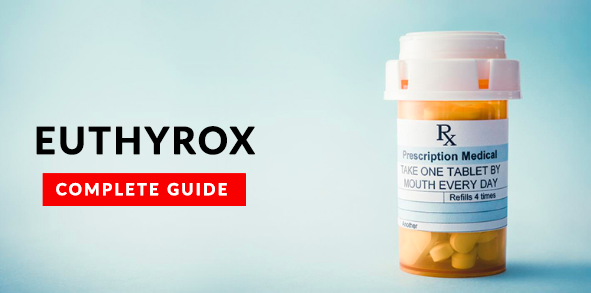Euthyrox contains the active pharmaceutical ingredient levothyroxine synthetic crystalline levothyroxine (T4) in sodium salt form has an identical chemical structure to the T4 endogenous hormone produced by the thyroid gland of the human body. Its molecular weight is 798.85 g/mol and contains many excipients like citric acid anhydrous, corn starch, gelatin, mannitol, sodium croscarmellose, and magnesium citrate. Euthyrox is available in tablet form for the oral administration and is available in different strengths like 25 mcg, 50 mcg, 75 mcg, 88 mcg, 100 mcg, 112 mcg, 125 mcg, 137 mcg, 150 mcg, 175 mcg, and 200 mcg.
Table of Contents
INDICATION of Euthyrox
- HYPOTHYROIDISM
EUTHYROX is prescribed to pediatrics and adults as a replacement in primary (thyroidal), secondary (pituitary), and tertiary (hypothalamic) congenital or acquired hypothyroidism.
- Pituitary thyrotropin
It is also indicated in patients as an adjunct to surgery and radioiodine therapy in the management of thyrotrophin-dependent well-differentiated thyroid cancer.
- Goiter
Euthyrox is also used to treat or prevent goiter (enlarged thyroid gland) which can be caused by several causes like a hormone imbalance. It is also used to treat thyroid cancer. Read more
Dosage and administration of Euthyrox
Euthyrox should be administered once daily, on an empty stomach, one half to one hour before breakfast and 4 hours before and after these medicines: antacids, calcium supplements, stomach medicines, and iron supplements because these medicines interfere with the absorption. Starting dosage depends upon many factors like age, body weight, pregnancy, cardiovascular status, and co-administered foods. Peak therapeutic effect may not be attained for 4 to 6 weeks.
Euthyrox guidelines for the treatment of hypothyroidism
| Age | The daily dose per kg of body weight |
| 0 to 3 months | 10 mcg/kg daily to 15 mcg/kg daily |
| 3 to 6 months | 8 mcg/kg daily to 10 mcg/kg daily |
| 6 to 12 months | 6 mcg/kg daily to 8 mcg/kg daily |
| 1 to 5 years | 5 mcg/kg daily to 6 mcg/kg daily |
| 6 to 12 years | 4 mcg/kg daily to 5 mcg/kg daily |
| Greater than 12 but puberty incomplete | 2 mcg/kg daily to 3 mcg/kg daily |
| Greater than 12 and puberty complete | 1.6 mcg/kg daily |
Contraindication
Euthyrox is contraindicated to kidney patients because it can cause uncorrected adrenal sufficiency. Levothyroxine can increase heartbeat and can cause angina so it is contraindicated to heart patients. It is also contraindicated for patients of diabetes Mellitus because it may worsen glycemic control. Euthyrox can not be used for weight loss.
Side effects of Euthyrox
- General Side effects
Fatigue, increased appetite, weight loss, fever, excessive sweating.
- Dermatologic Side effects
Hair loss, Flushing, Rash.
- Cardiovascular Side effects
palpitations, arrhythmias, increased blood pressure.
- Central nervous system Side effects
headache, nervousness, anxiety.
- Musculoskeletal Side effects
tremors, cramps, and muscular weakness.
- Respiratory Side effects
dyspnea
- Endocrine Side effects
decreased bone mineral density
- Reproductive Side effects
menstrual irregularities, impaired fertility.
- Gastrointestinal Side effects
diarrhea, vomiting, elevation in the liver function test.
Levothyroxine therapy can cause seizures in some rare cases.
Overdose of Euthyrox:
An overdose of euthyrox can cause hyperthyroidism in addition confusion and disorientation may occur inpatient. Shock, coma, and death have been reported due to overdose. It may cause seizures if eaten in the wrong dosage. Symptoms may or may not appear after a few days of ingesting levothyroxine sodium.












